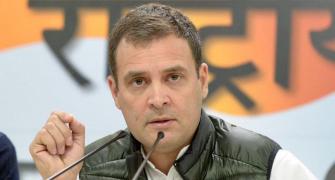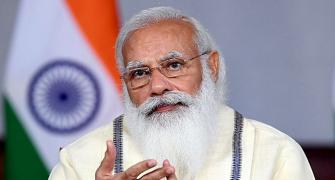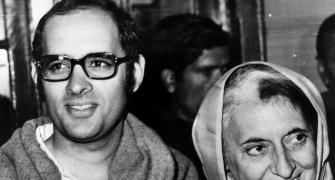It has been nearly 50 years but Lucknow-resident Tej Narayan Gupta vividly remembers the evening a police team knocked on his door and picked him up.

A nationwide crackdown had begun on June 26 in 1975, a day after the Emergency was imposed in the country, with scores of opposition leaders and activists put behind bars.
"Around 9 pm I had just returned home when a police team raided my house and arrested me," Gupta, who was then an activist and lawyer, said.
A policeman took him on a bicycle to Bazar Khala police station, two km away from his home.
He was then taken to Kaisarbagh police station and finally lodged in the Lucknow district jail along with other arrested persons.
"The policeman was riding the bicycle, which was taken from a labourer, and I sat on the rod in front of him. He was riding the cycle very slowly. The motive was to create terror in the minds of the residents of my locality," Gupta, 83, told PTI.
Equating the imposition of the Emergency with dacoity, he said, "Generally, dacoity is carried out around midnight. Similarly, this dacoity of democracy in the country also took place around midnight."
The Indira Gandhi government imposed the Emergency on June 25 night, suspending civil liberties and censoring the press. The morning after a crackdown began on opposition leaders and activists with scores of them being jailed across the country.
"In jail, we were not sure about the future and whether we will ever walk out of it," Gupta said.
Months later the situation changed and the Emergency was lifted on March 21, 1977.
In his 'Mann Ki Baat' radio broadcast on June 18, Prime Minister Narendra Modi described the Emergency as a "dark period" in India's history and said those who supported democracy at that time were tortured.
According to the Political Pension Department of Uttar Pradesh, 4,755 of those arrested during the Emergency in the state are still alive. They are now called loktantra senani or fighters of democracy".
Among them are 83-year-old Ramdeen and 74-year-old Kedar Nath Srivastava.
"An atmosphere of fear and uncertainty prevailed in the minds of people during the Emergency.... The forced sterilisation made people go against the Congress in the subsequent general elections," Ramdeen said.
Srivastava said, "After being arrested, many of us wondered whether we are going to live in the jail forever!"
Hriday Narayan Dixit, a former speaker of the Uttar Pradesh Assembly, also recalled his incarceration during the period.
"I was lodged in Unnao jail.... The parliamentary elections were announced and we were hopeful that the Congress and Indira Gandhi would be defeated. On the night of counting of votes, I somehow managed to get a radio and was listening to announcement of results.
"Late in the night, the deputy jailor came and said 'agar transistor mila toh danda kardoonga' (If a radio is found, you will be beaten with club). At around 4 am, we got the news that Indira Gandhi lost the election from Rae Bareli. The same deputy jailor came running towards my barrack and said 'badhaai ho, sir' (congratulations). When I asked how your tone changed so soon, he said 'you are forming the government'," Dixit, then a Jana Sangh leader, recalled.
The Emergency was imposed on the pretext of internal disturbance though there was no such issue, he said.
"It was a situation for which the country was not prepared, it had never happened before. The new generation should know about it so that in future no ruler gets the audacity to commit such an act," Dixit, 76, said.
Senior Samajwadi Party MLA from Itwa in Siddharthnagar district Mata Prasad Pandey told PTI that "uncertainty and fear" prevailed during the days of the Emergency.
Pandey, also a former speaker of the Uttar Pradesh Assembly, was lodged in Basti jail.
Referring to the mass sterilisation drive during the Emergency, he said, "Police used to harass people. People used to hide atop trees or in sugarcane fields. Such was the fear."
"However, at that time, only the leaders were arrested and their family members were not harassed," Pandey, 70, said.









